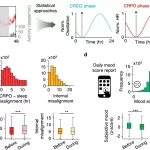
Researchers have uncovered a concerning association between per- and polyfluoroalkyl substances (PFAS), commonly known as “forever chemicals,” and the metastasis of colon cancer, a revelation detailed in the journal Environmental Science & Technology. The study findings indicate that these industrial chemicals can prompt the migration of cancer cells, potentially contributing to the spread of cancer throughout the body.
Colon cancer, also known as colorectal carcinoma (CRC), exhibits a higher incidence among firefighters, who face substantial exposure to PFAS in their occupational environments. Citing environmental exposure as a significant factor in nearly 80% of CRC cases, researchers stressed the need for studies delving into the relationship between PFAS and colorectal carcinoma, highlighting the absence of prior investigations in this domain.
In a series of meticulously designed experiments, researchers immersed CRC cells in PFAS solutions for up to seven days, observing notable reactions within the cells. The exposure to forever chemicals resulted in increased cell motility and triggered metabolic changes consistent with the progression of cancer metastasis, aligning with existing knowledge about CRC metabolism, dissemination, and prognosis.
The study specifically focused on perfluorooctanoic acid (PFOA) and perfluorooctanesulfonic acid (PFOS), frequently utilized in firefighting foam and various other products, both classified as carcinogenic to humans.
Examining two types of CRC cells—SW48 cells with a wild-type KRAS gene and those carrying a common mutation associated with a severe form of colon tumor in women—the researchers noticed significant responses. When exposed to PFAS, the cells exhibited enhanced migration ability, displaying tendencies to spread and penetrate membranes, indicating characteristics akin to metastasis.
Caroline Johnson, Ph.D., an associate professor of epidemiology at Yale, highlighted the observed increase in cell motility as a hallmark feature of metastasis, particularly pronounced in the KRAS-mutated cell line. This suggests that cancers carrying this mutation might be more susceptible to spreading after exposure to PFAS.
While the study doesn’t outright confirm metastasis, the demonstrated changes hint at heightened metastatic potential induced by exposure to these chemicals. The research underscores concerns about PFAS exposure and its impact on cancer progression, especially for high-risk groups such as firefighters, urging further investigations to comprehend and address this worrisome correlation.










